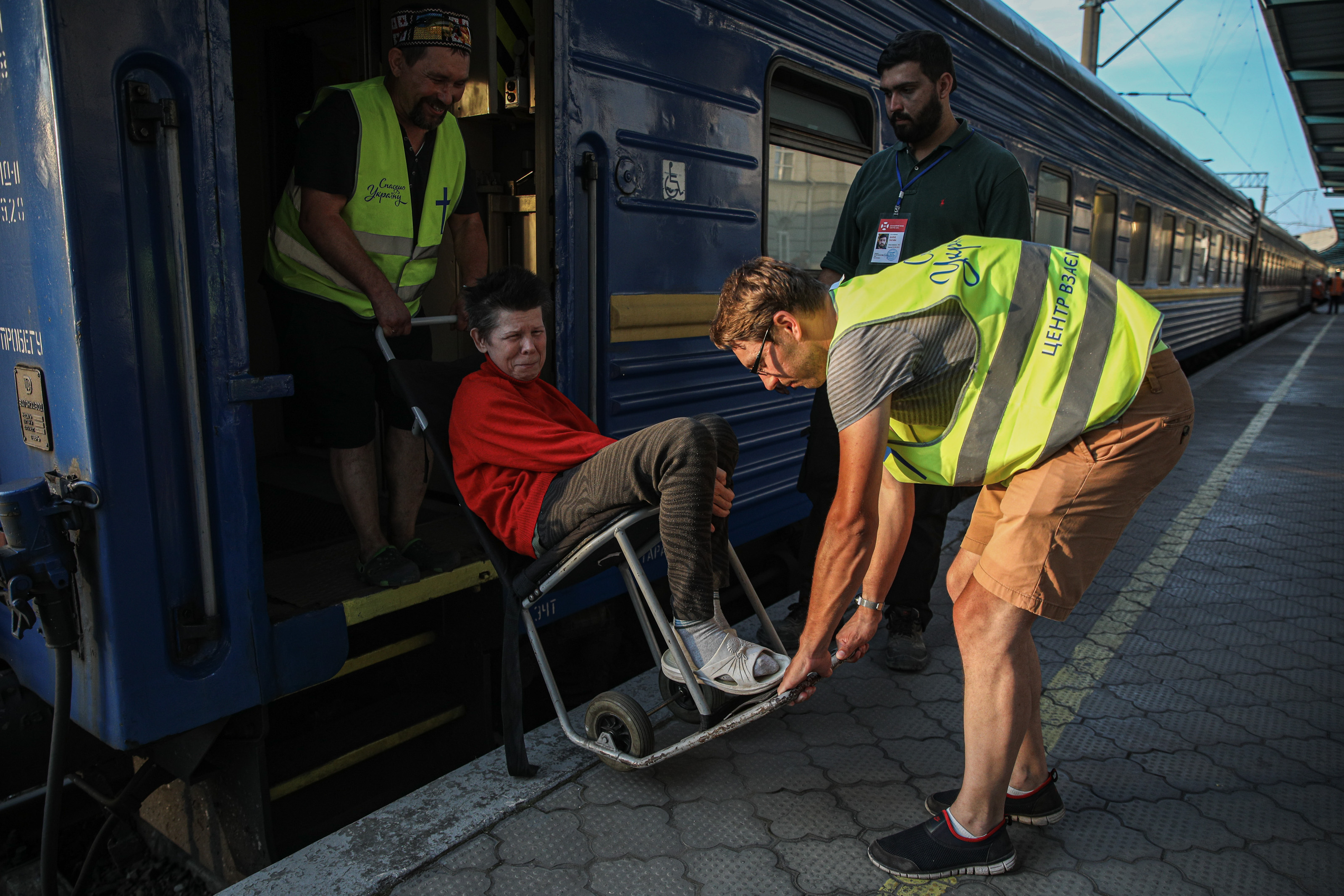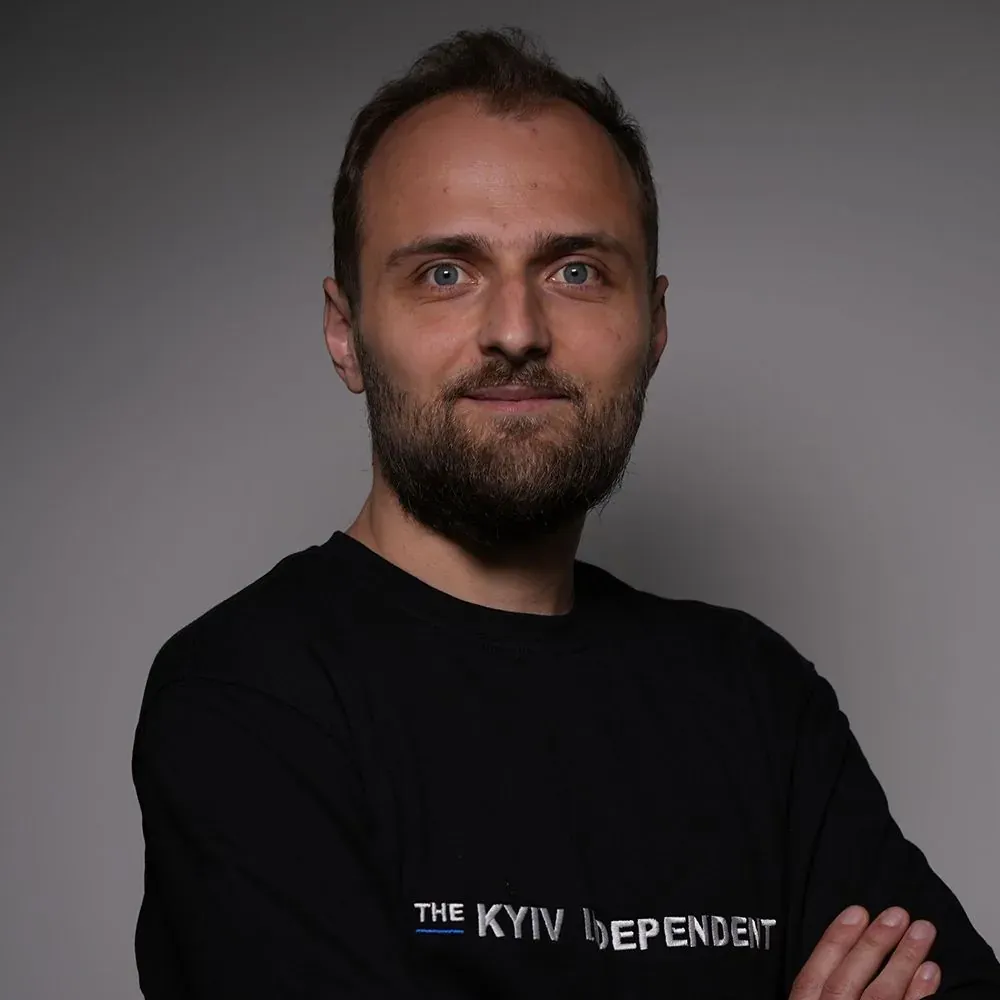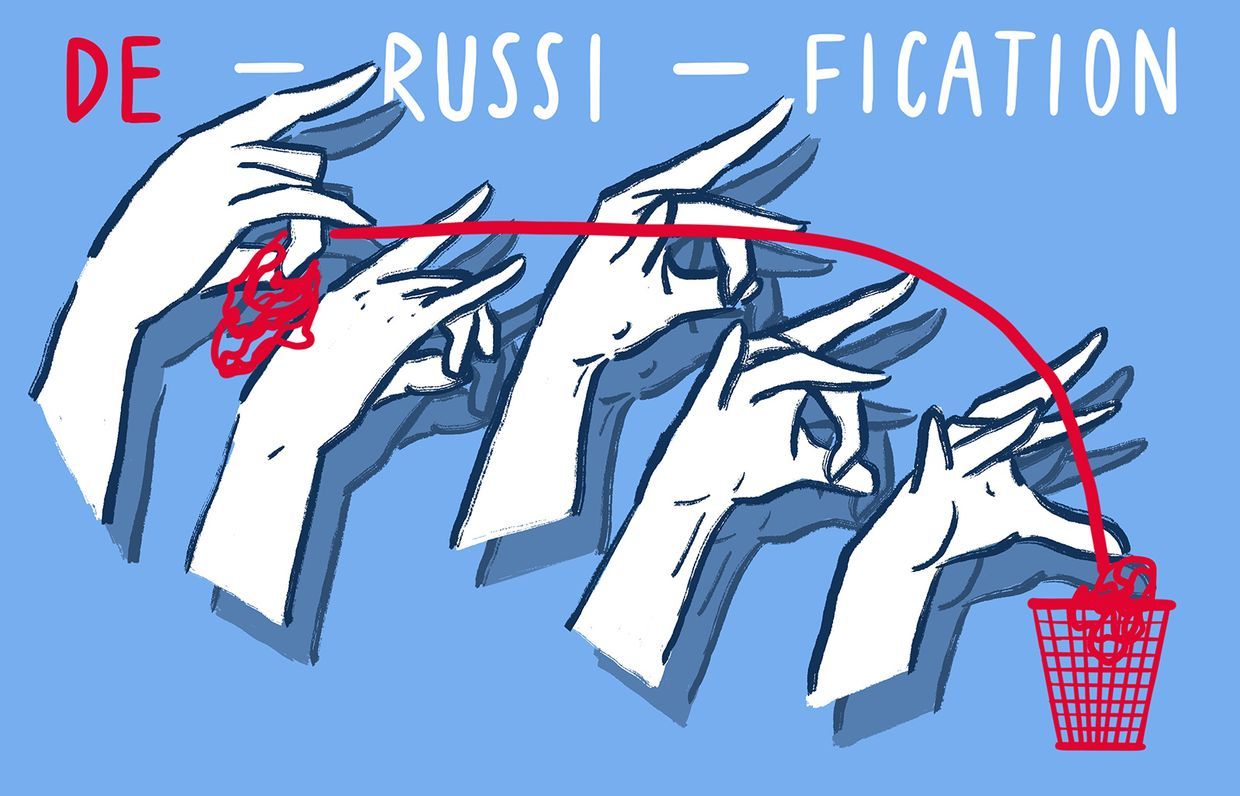When the expert committee at the Ukrainian Society of the Deaf was working on de-Russifying the word “thank you” after the start of the full-scale war, there was the suggestion to leave it be, Tetiana Kryvko, the society’s deputy head, tells the Kyiv Independent.
Before Russia’s full-scale invasion, Ukrainians who use sign language would have thanked one another with the Russian sign, a gesture that resembles taking one’s hat off and bowing.
“But we (Ukrainians) should not bow in front of anyone,” she both says and signs. Kryvko, who has been deaf since the age of five, uses vocal and sign language.
“So we got rid of it, and now use the (international) sign for ‘thank you,’” which is signed by taking your dominant hand to your chin and moving it slightly down and towards the person you are talking to.
As Kryvko explains, she stops to make the sign for de-Russification a second time, this time more slowly: her thumb glides across her lower lip, joining her index finger to make the Russian letter “R” before making a flicking motion with her fingers.
She chuckles, knowing perfectly well that for Ukrainians, there’s a certain enjoyment in “flicking away” Russia as if it were a bug or a piece of lint.
De-Russification, a process of removing Russian and Soviet cultural, linguistic, and societal influence or symbols in favor of the national identity, has been ongoing in Ukraine since the collapse of the Soviet Union. Russia’s full-scale invasion has rapidly accelerated this phenomenon.
During the Soviet era, Ukrainian Sign Language was practically done away with as signs and fingerspelling were replaced with Russian ones.
Kryvko, whose organization represents around 38,000 Ukrainians, says that more and more people who use sign language in Ukraine have been looking to dispose of Russian signs and fingerspelling since the start of the war.
“Today, the deaf community in Ukraine wants nothing to do with the Russian language. As a result, many either avoid (signing in Russian) entirely or in part,” Kryvko says in her office in downtown Kyiv.
The society’s response to the war isn’t just about the language. Between air raid sirens, explosions, and important announcements by officials, those who cannot hear or speak have at times found themselves in incredibly precarious situations and lacking government support.

The sounds of war
In the early days of the full-scale invasion in Sumy, a northeastern city that Russian forces have attempted to capture since day one, a group of around 30 people walked one after another along an unlit footpath.
"Halt!" called armed Ukrainian soldiers from the bushes. They didn’t know the group included people who couldn’t hear them.
Olesia Kovtun, who heads the Regional Society for the Deaf in Sumy Oblast, heard the order and explained to Ukrainian soldiers that they were on their way to a bomb shelter.
“No one knows what could have happened if there weren't hearing people nearby. (Later), I had a feeling that they might have opened fire. They were armed. These were the first days of the invasion,” Kovtun told the Kyiv Independent.
When a shower of Russian missiles and artillery barrages fell on Ukraine on Feb. 24, 2022, deaf Ukrainians were in an information vacuum, Kryvko said. “People watched the president saying something, but they didn't know what exactly.”
The Society for the Deaf’s work involves protecting the legal rights of the deaf and mute community in Ukraine. Kryvko and her colleagues hoped that President Volodymyr Zelensky’s office would provide sign language interpretation independently.
"Unfortunately, this didn't happen. So, we decided to translate the president's addresses and important information that comes out ourselves," according to Kryvko.
Now, the society’s website and social media are full of videos where President Zelensky speaks alongside sign language interpreters.
Kryvko says every deaf and mute Ukrainian knows words like air raid alert, bomb shelter, explosions, Shahed kamikaze drone, cluster munitions, and artillery — previously known by a narrow group of trained interpreters.
Telegram channels established during the initial phase of the full-scale invasion have also since adapted to help deaf Ukrainians receive air raid notifications.
Nonetheless, Kryvko regrets that the government hasn’t done more for the deaf and mute community to inform them of the dangers that exist, like what to do during an air raid alert or if an explosion occurs nearby.
“The state should be responsible for the lives and health of people regardless of their health and hearing condition. However, it is unwilling to do so and shifts everything onto the shoulders of an NGO,” said Kryvko.
“But an NGO is not the State Emergency Service.”

Sign Language Commission
As the war goes on, Ukraine’s deaf and mute community continues to develop Ukrainian Sign Language, campaigning for national sign language.
According to World Atlas, 41 countries recognize sign language as one of their official languages. Most of them, 26, are in Europe. Ukraine is not on the list.
People who use sign language have created several Telegram groups to discuss Ukrainian Sign Language, exchanging ideas on Ukrainian equivalents for Russian words.
The society took this one step further, developing an expert commission of Ukrainian sign language to eradicate Russianisms and other Russian influences in sign language.
Commissioner Natalia Adaniuk, a fourth-generation deaf person, remembers the Soviet-era schools for learning sign language. Two-thirds of the schools back then taught children to use Russian Sign Language, she said via Olena Butenko, a Ukrainian Sign Language interpreter.
The Soviet period was devastating for both the Ukrainian vocal and sign languages. As the Soviet regime conducted linguicide, a linguistic genocide that involved making Ukrainian words sound similar to Russian, so too did it pursue a silent purge of Ukrainian Sign Language.
Soviet dictator Joseph Stalin scorned sign language and dismissed deaf people as “anomalous abnormal people.” In his article “Marxism and Problems of Linguistics,” Stalin falsely claimed that sign language is “not a real language or even surrogate of the language.”
“(The Soviets) forcibly taught deaf people only in Russian,” Adaniuk told the Kyiv Independent.
In a push for national status for Ukrainian Sign Language, the society’s expert commission constantly reconstructs historical signs, develops new signs and fingerspelling, creates entirely new ones, or adopts international gestures, as they did with the word “thank you.”
“We are trying to get rid of all sign characters that have even a hint of Russianism,” said Adaniuk.
______________________________________________________
Note from the author:
Hello, this is Alexander Khrebet, who wrote this story for you.
I hope you found it insightful and interesting to read how Ukraine’s deaf community is actively decolonizing Ukrainian sign language, reclaiming their linguistic heritage, examining sign language for any vestiges of colonial power forms.
The Kyiv Independent is helping to keep the world informed about Ukraine, but we also need help from every one of you — to support Ukrainian wartime journalism by becoming our supporter.














